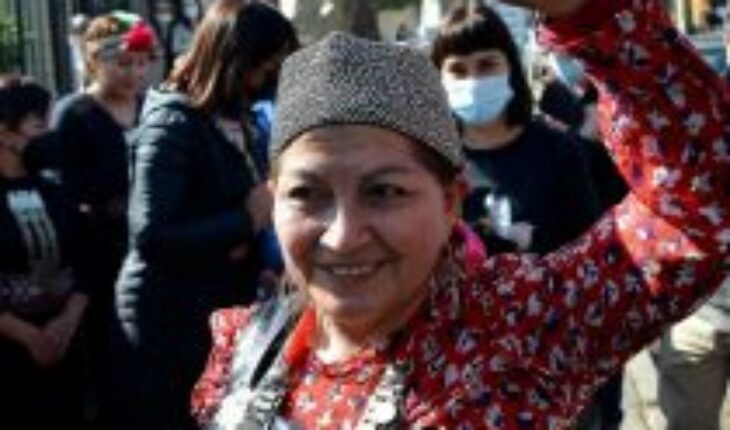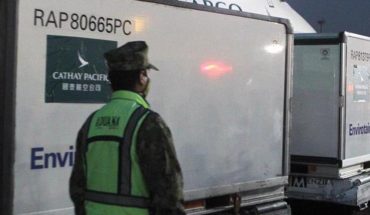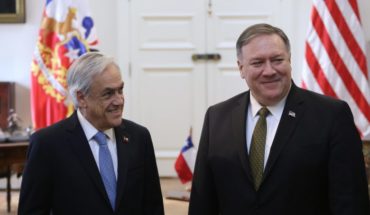Along with congratulating Rapa Nui for the decision it took by a majority in the plebiscite of September 4 – the only commune with a high indigenous population that opted for the Apruebo – and highlighting the participation of indigenous women in the political debate, Elisa Loncon assured that the triumph of the Rejection of the constitutional proposal emanating from the constitutional convention that she herself presided over, in the Mapuche area, it occurred due to “violence, marginalization, economic instability and fake news.” In the Wallmapu, he said, the position of the two extremes that do not want to dialogue strongly influenced: “the ultra-right and the radicalized Mapuche groups that long ago left behind all protocol of political dialogue.”
In an interview with El Mostrador, the former conventional also addressed the role of reserved seats in the country’s first constitutional convention, mainly for having installed plurinationality in the political debate – in line with international treaties – emphasizing that “it is a constitutional principle that does not threaten the unity of the State.” However, accusing a campaign of terror against this concept and highlighting the context of violence typical of the State of Exception, he pointed out that the conventional ones lacked support from their own people.
– What is your assessment of the rejection of the communes with the largest indigenous population — except Rapa Nui — to the proposal of the Constitutional Convention that you integrated, despite the fact that it was included to declare Chile as a Plurinational State?
-First, congratulate Rapa Nui and recognize the work of the former conventional Tiare Aguilera for her achievements and support of her people. Rapa Nui is a nice case to follow. The Rejection in the Mapuche area is proportional to the rejection in communes and sacrificed areas in Chile such as Petorca and sectors such as the prisoners, in this there was more or less 1/3 of support. The reasons for the Rejection are the same as those that have already been commented, the violence, marginality, economic instability, and the very good campaign of the Rejection that covered all the local radios misinforming the community: that they would lose their homes, that plurinationality divides Chile, etc, etc. The Wallmapu was strongly influenced by the position of the two extremes that do not want to dialogue: the ultra-right and the radicalized Mapuche groups that long ago left behind all protocol of political dialogue. We must also rescue the positive, the reserved seats we did politics, we did pedagogical work, we achieved the support of the other political sectors and this was not easy. We install in the political debate plurinationality as a constitutional principle to dialogue politically with the State, we fill it with contents with the rights of the peoples, those that are part of international treaties signed and ratified by our own rulers, are part of the unavoidable human rights of the peoples: the right to land, autonomy, self-determination, cultural and linguistic rights, and none of this threatens the unity of the State, as the treaties say and that is why the former presidents of Chile signed it after the dictatorship.
In the process it is important to highlight the participation of indigenous women in the political debate, those who previously toured the communities organizing our peoples to recover rights, who live the tradition, marginalization and who prepared all our lives for that moment.
– Do you agree with the approach of the lawyer and former conventional Rosa Catrileo, who said that the rejection of the Mapuche to plurinationality is only a speculation and that the mismatch of occurred for other reasons?
-As I already explained, they voted as Chilean and Mapuche or Chilean Mapuche, who live in sacrificial territory, pushed by a good campaign of terror and with a lot of violence typical of the State of Exception. We conventionalists lacked support from our own people, in addition to the campaign against plurinationality. Although there were outstanding brothers that I do not name so as not to leave any name out and that the people recognize them by their faces, words and their feathers, but others, they showed off calling to reject. We are a society that seeks balances, reciprocity, complement, our leaders in the past stood out for their diplomacy and all this we needed. If we still exist it is thanks to collective norms, our values and knowledge, the politics of brotherhood and that we should nots to let go, today more than ever.
– Could we say that on September 4 the rejection of the plurinationality of the country won and therefore a nationalist feeling triumphed, as Professor Enrique Antileo also points out?
-The Rejection motivated by plurinationality was one of the many reasons but all the Rejection does not fall only on plurinationality. I speak from within the process, as a woman, from self-criticism and not as a spectator. Chile was founded without us, without the peoples and policies have been made so that we disappear, we have to review our history so as not to repeat the genocide that the State carries in its history with the original peoples. We are the survivors of that dark history and we have permeated Chilean society biologically, culturally, with language; Chile, its culture and identity is not without its indigenous roots, let’s not forget that the greats of literature were recognized for their territories and roots, Neruda and Mistral, Violeta Parra as Nicanor, have always reminded us. What happened with plurinationality was a campaign of terror coupled with contempt for indigenous peoples; what also happened was the lack of care and failures of the Convention itself, we did not take care of the ways so important for the people, the people, the people wanted to see us without the mistakes made, they did not care about our sacrifice or the self-exploration to which we exposed ourselves and the rejection was commissioned from within to ignore us as part of Chile, criticizing our language, our costumes, what for us was the most beautiful, they transformed it into the most repudiable; errors and weaknesses were inputs to rejection, first discrediting the messenger and then the message; for which he had the economic and media resources. I also felt the lack of support as I have stated. We need strong political organizations that articulate political dialogue with the State, with parties and social movements. When I was president I received two groups of authorities from Traiguén and Lumaco, they came to give us their support, it was a nice gesture of people and brothers; we needed this and many more. The parties also have centers of studies and resources, the peoples do not. We need to reinforce the strategy of political horizontality, of community that Leftraru and Janequeo used to defend their people, so that if one falls, ten, a hundred and thousands will rise, as our mariachiweu says.
Today it is true that the concept of plurinationality is wounded, however, I must remind you that the CEP survey indicates that more than 80% of the Mapuche population recognizes mapuche, Mapuche-Chilean or Chilean-Mapuche, all these identity crosses speak of a plurinational and intercultural society. I believe that these issues cannot remain so pending, and we must find ways in the new constituent process this heterogeneous unity that we are as a country. We need a second chance with plurinationality so that all the people of Chile understand that our struggle is not to oppress or dominate anyone, even less to strip them of their rights; we just want to continue living as peoples in our territory, together with the history that we have been building in this country called Chile. The social explosion showed spontaneously and intelligibly how uninationality was transformed into plurinationality, with the flags of the peoples and with our languages written on the walls. A delayed language regained its social function in the streets. When we spoke Mapuzugun and television showed it to Chile, the girls and boys wanted to learn our languages. This Chile exists, it has only been hurt.
– What do you think of the current discussion on elaborating a new Constitutional Convention and what do you think of the fact that the discussion on seats reserved for Indigenous Peoples has been left pending? Do you agree with the deputy Emilia Nuyado (PS), who said that it is racist to leave this discussion for the last?
The constitution must be for all peoples; democracy must be pluralized to strengthen society, today it is also wounded with so much distrust of the parties, the parliamentarians, the government. We need to look at ourselves as a Chile that has overcome exclusion, in our substantive equality. Therefore, I call on the indigenous parties, from the left to the right to act collectively for the rights of political representation of their peoples, as we did the conventional, work on their referents to change that colonial mentality of domination to the other because it is indigenous. Peoples like women have the legitimacy to represent our struggles, feelings and contributions. The Reserved Seats earned a place in the discussion of Chilean democracy. Even though the proposal of nuEva Constitution was rejected there are issues to address, and these cannot be left out, one of them are the indigenous peoples, we need to advance in a participatory and representative democracy of Chilean society as a whole In addition the State has a historical debt to the peoples, even the right of the former Convention recognized this debt in a letter to the peoples, headed by Hernán Larraín. Reserved seats represent the political way to resolve a centuries-old conflict and parties must be visionary.
– How should the idea of plurinationality be addressed in the eventual new Constitution?
-Based on what has already been advanced in legal and technical matters in Chile; considering Indigenous Law 19.253, ILO Convention 169, the New Deal Report, the United Nations Declaration on the Rights of Indigenous Peoples. All these instruments make it possible to seek a solution to the dispossession of land, collective goods, language and culture, to advance in political rights for the peoples, with political representation via reserved seats, and in the exercise of autonomy and hare determination in their territories. They are our rights and their recognition constitutes the solution to the problems of centuries that the State has with the peoples, it is the political path that we resume in the constituent work.
Follow us on





